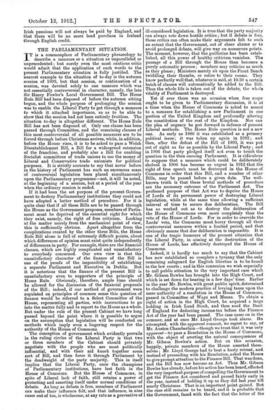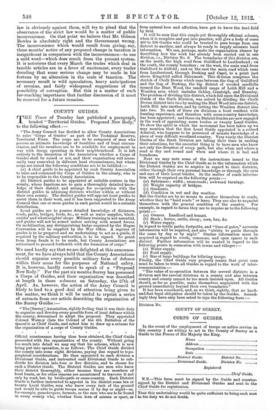THE PARLIAMENTARY SITUATION.
IT is a commonplace of Parliamentary phraseology to describe a measure or a situation as unparalleled or unprecedented ; but surely even the most cautious critic would admit that the application of such words to the present Parliamentary situation is fully justified. The nearest example to the situation of to-day is the autumn session of 1893, but that session, or continuation of a session, was devoted solely to one measure which was not essentially controversial in character, namely, the late Sir Henry Fowler's Local Government Bill. The Home Rule Bill had been disposed of before the autumn sitting began, and the whole purpose of prolonging the session was to enable the Liberal Party to get through a measure to which it attached importance, so as to be able to show that the session had not been entirely fruitless. The situation to-day is altogether different. The Home Rule Bill has not been disposed of. Only one clause has been passed through Committee, and the remaining clauses of this most controversial of all possible measures are to be forced through before Christmas arrives, while, in addition, before the House rises, it is to be asked to pass a Welsh Disestablishment Bill, a Bill for a widespread extension of the franchise, and probably also a Bill for enabling Socialist committees of trade unions to use the money of Liberal and Conservative trade unionists for political purposes. It is strictly accurate to say that never before in the history of Parliament has such an enormous mass of controversial legislation been placed simultaneously upon the Parliamentary programme—not, it will be noted, at the beginning of a session, but at a period of the year when the ordinary session is ended.
If it had been the set purpose of the present Govern- ment to destroy Parliamentary institutions they could not have adopted a better method of procedure. For it is quite clear that if all these Bills are to be passed through the House as the Government proposes, members of Parlia- ment must be deprived of the essential right for which they exist, namely, the right of free criticism. Looking at the matter merely from the mechanical point of view, this is sufficiently obvious. Apart altogether from the complications created by the other three Bills, the Home Rule Bill alone is full of extremely difficult points, about which differences of opinion must exist quite independently of differences in party. For example, there are the financial clauses, which are highly complicated and unsatisfactory to everybody concerned. Our own view is that the unsatisfactory character of the finance of the Bill is one of the proofs of the impossibility of establishing a separate Parliament and Executive in Dublin. But it is notorious that the finance of the present Bill is unsatisfactory even to supporters of the principle of Home Rule. Obviously, therefore, ample time should be allowed for the discussion of the financial proposals of the Bill ; indeed, if our method of government were regulated on principles of common sense this question of finance would be referred. to a Select Committee of the House, representing all parties, with instructions to go into the matter fully and to report to the House as a whole. But under the rule of the present Cabinet we have long passed beyond the point where it is possible to argue on the assumption that legislation will be conducted on methods which imply even a lingering respect for the authority of the House of Commons.
The conception of government which evidently prevails in the ruling circles of the Liberal Party is that two or three members of the Cabinet should privately negotiate with the people who are most politically influential, and with their aid knock together some sort of Bill, and then force it through Parliament by the deadweight of the party majority. This in itself implies that the Liberal Party, once the champions of Parliamentary institutions, have lost faith in the House of Commons. But the House of Commons, in spite of Liberal lack of faith, still retains a power of protecting and asserting itself under normal conditions of debate. As long as debate is free, members of Parliament can make their influence felt, and that influence, in nine cases out of ten, is wholesome, at any rate as a preventive of ill-considered legislation. It is true that the party majority can always vote down hostile critics ; but if debate is free.
those critics can often make their arguments felt to such an extent that the Government, out of sheer shame or to avoid prolonged debate, will give way on numerous points. The moment, however, that the guillotine has been estab- lished, all this power of healthy criticism vanishes. The passage of a Bill through the House then becomes a purely automatic process ; members may criticise as much as they please ; Ministers merely sit upon the Front Bench twiddling their thumbs, or retire to their rooms. They know perfectly well that, whatever is said, at 10.30 a certain batch of clauses will automatically be added to the Bill. Thus the whole life is taken out of the debate, the whole vitality of Parliament is destroyed.
Yet if ever there was an occasion when free scope ought to be given to Parliamentary discussion, it is at a time when the House of Commons is asked to assent to a measure for establishing a new Parliament in one portion of the United Kingdom and profoundly altering the constitution of the rest of the Kingdom. Nor can the plea of urgency be put forward in defence of present Liberal methods. The Home Rule question is not a new one. As early as 1886 it was established as a primary political issue ; it was taken up again in 1892; and then, after the defeat of the Bill of 1893, it was put out of sight as far as possible by the Liberal Party ; and in 1906 that party pledged itself not even to touch the question in the then ensuing Parliament. It is ridiculous to suppose that a measure which could be deliberately shelved in 1906 has become so urgent in 1912 that the right of free speech must be destroyed in the House of Commons in order that this Bill, and a number of other Bills, may be passed before a given date. The well- known truth is that these brutal methods of procedure are the necessary outcome of the Parliament Act. The professed purpose of that Act was to deprive the House of Lords of its permanent power of destroying Liberal legislation, while at the same time allowing a sufficient interval of time to secure due deliberation. The Bill has so worked out as to destroy the deliberation of the House of Commons even more completely than the veto of the House of Lords. For in order to override the Lords' veto, the Commons must hurry through all their controversial measures within a limited period, and that obviously means that due deliberation is impossible. It is one of the tragic humours of the present situation that the Liberal Party, in aiming at the destruction of the House of Lords, has effectively destroyed the House of Commons.
Indeed, it is hardly too much to say that the Cabinet has now established so complete a tyranny that the only remaining safeguard for English liberties is to be found in the law courts ; and in this connexion we wish especially to call public attention to the very important case which Mr. Gibson Bowles has brought into the High Court, and which is set down for hearing in a few days' time. Earlier in the year Mr. Bowles, with great public spirit, determined to challenge the modern practice of levying taxes upon the mere authority of a resolution in the House of Commons, passed in Committee of Ways and Means. To obtain a, right of action in the High Court, he acquired a, largo holding in Irish Land Stock, and then sued the Bank of England for deducting income-tax before the Finance Act of the year had been passed. The case came on in the summer, and at once Mr. Lloyd George took alarm. Ho attempted, with the apparent consent, we regret to say, of Mr. Austen Chamberlain—though we trust that it was only apparent—to pass a Resolution in the Horse of Commons. with the object of averting the natural consequences of Mr. Gibson Bowles's action. But on this occasion, happily, private members of the House asserted them- selves ; Mr. Lloyd George had to beat a hasty retreat, and instead of proceeding with his Resolution, asked the House to give prompt attention to the Finance Bill. That was done, and the Bill has now become an Act. Thus Mr. Gibson Bowles has already, before his action has been heard, effected the very important purpose of compelling the Government to get the Finance Act considered and passed fairly early in the year, instead of holding it up as they did last year till nearly Christmas. That is an important point gained. But the case still remains to be heard, and it is probable that the Government, faced with the fact that the letter of the law is obviously against them, will try to plead that the observance of the strict law would be a matter of public inconvenience. On that point we believe that Mr. Gibson Bowles is absolutely right and the Government wrong. The inconvenience which would result from giving, say, three months' notice of any proposed change in taxation is insignificant in comparison with the inconvenience—to use a mild word—which does result from the present system. It is notorious that every March the trades which deal in taxable articles are in a fever of excitement, every trader dreading that some serious change may be made in his fortune by an alteration in the scale of taxation. The necessary result is wild speculation, heavy anticipations of revenue, and fairly widespread suggestions of the possibility of corruption. But this is a matter of such far-reaching importance that further discussion of it must be reserved for a future occasion.











































 Previous page
Previous page